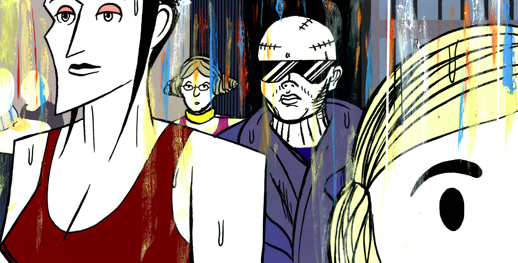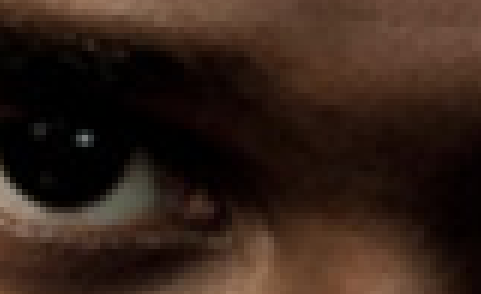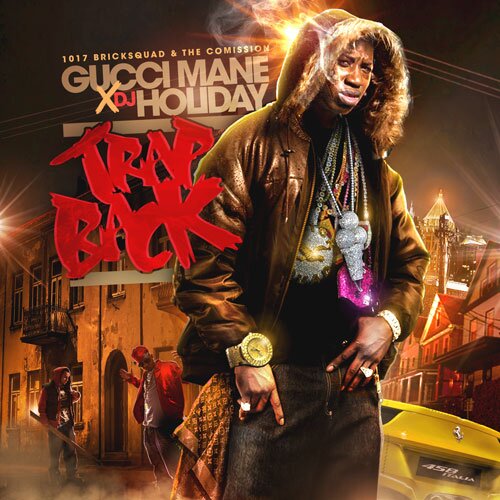Though 2 Chainz is the next exciting thing in trap-rap weirdo personalities–more knowing than Future, three times the personality of Meek Mill, and a total maniac–he’s still no Gucci Mane and “Get It Back” proves it. There’s probably more lines for you to quote to your GChat buddies when 2 Chainz pops-up (“Get your baby mama, take her then make her/You date her, then fuck her, I fuck her then date her/Everything is on the up, like an elevator”), but Gucci sounds alive and unconcerned, doing his head-down, straight rapping, stumbling upon a catchy phrase and not a big obvious hook From Zone 6 To Duval thing like it’s 2009 again. Producer Mike Will Made It takes the theme from Tetris and adds a boom of low-end every few bars, tosses in a few chintzy keyboard bloops and some Mannie Fresh synth-organs, making a potentially shticky production way more dynamic than it needs to be. Notice how this whole mixtape just kinda pretends the Lex Luger-ization of rap never happened. Even Lex’s “Blessing” isn’t by-the-numbers, stop-start glitching corner kid stomp. Drumma Boy remains the model here. And observe how closed-circuit and word-focused Gucci’s rapping is. He’s a lyricist, guys! A nerdy MC only worried about piling syllables on top of beats. I get the impression that the people around Gucci just hoard his good music, all made in his moments of clarity, so it’s hard to tell if “me and Slim Dunk in the clubs throwin’ racks” is simply there because this was written before Dunkin’s death, or if it’s a tight-lipped reminisce. I’d like to think it’s the latter, and either way, it’s very touching.
Archive for the ‘Uncategorized’ Category
Spin: “The Rise of Rap’s Regular Guys.”
On G-Side, Tabi Bonney, and Stalley, and what it means to be moderately famous in rap.
A rapper’s narrative is pretty much always the same: Enter the young, hungry wordsmith who has finally, gloriously, made it. Lately though, thanks to the Internet, which makes it easy to bypass labels and normal promotional routes, as well as a messy, confused industry that often protracts buzz, the next big thing remains on the come-up for far too long, eventually staring down their official debut with a well-defined, often self-satisfied persona.
On last year’s Thank Me Later, Drake skipped the hungry, earnest rapper stage and proceeded directly to the “I’m famous, now what?” point in his career, and producer-rappers like J. Cole and Big K.R.I.T saddled their striving-for-classic mixtures with a “small town on my shoulders” martyr complex that demanded fame they’d not yet earned and had them questioning whether that fame was even worth it in the first place. Recent releases from Huntsville, Alabama’s G-Side (The One…Cohesive), Washington D.C.’s Tabi Bonney (Postcard From Abroad), and Massillon, Ohio’s Stalley (Lincoln Way Nights) make those petulant meta-narratives look a little foolish…
MIX: 25 Best Rap Songs, 2010.
Had a few requests for a .zip of these songs, so I decided to make a mix instead (hit me up on Twitter if you want a zip though). Tried to sequence these in a way that maximized listenability and added something of a narrative to the year. So, we begin with ST from G-Side deconstructing Drake’s “Over,” telling the story of his label Slow Motion Sounds, and quipping (the way a rapper in 2010 only could), that his freestyle “will be all over the world” within a few hours. And we end with Bun B and DJ Premier paying a quick tribute to Guru and then, making rap that’s on auto-pilot sure, but is excellent nonetheless. In between, there’s some radio hits, some tracks everybody liked, a few I dare say are slept-on, and probably too much Baltimore hip-hop. Enjoy!
On Ryan Leslie’s “Christian Dior Denim Flow” Verse…
Late last week, Kanye released “So Appalled,” and tucked inside of that doomy, gloomy beat is the melody to Leslie’s “Addicted.” You really hear it at the beginning of Jay-Z’s verse. Kanye kinda repurposed it as this triumphant but sad, very 8-bit sounding thing, which totally works, but also made me just want to listen to “Addicted” as soon as possible, you know? A few days later, my local radio station played a Ryan Leslie mini-medley (“Addicted,” “Diamond Girl” into um, G-Unit’s “Bottom Girl”) and I’d like to think Kanye’s quasi-quote from “Addicted” reminded the hits station DJ of this 2008 minor hit, because you know, why else would he play songs from like, forever ago? That’s Ryan Leslie’s Top 40 reputation right now: Pretty much non-existent unless some DJ sticks a few personal picks into on an otherwise, Clear Channel-approved playlist.
This week, Ryan Leslie actually takes part in “G.O.O.D Music Friday” along with John Legend, Pusha T, Lloyd Banks, and Kid Cudi on “Christian Dior Denim Flow.” Of course, everybody’s third or fourth favorite nerdy R & B production genius is the most interesting part of the song. In part, he’s interesting because overall, the song is kinda whatever, but mostly because Leslie raps about as well as Diddy and has the same stuffed-nose delivery as early Common and that is a very awesome and memorable combination. He’s also hitting all the things that make Ryan Leslie so fascinating and emphatically not a superstar. He’s doing his morally serious nice-guy schtick here, breaking down some bad bitch at a club or wherever, but not as a hater, but like a concerned, wizened dad or something: “Man, I can see the flaws through your flavor/Look like Wonder Woman and still need a savior.” That’s very clever and pretty vicious.
From there, R. Les is in lecture mode (“I done seen drugs and money run the whole game”) and his half-raps interact really well with Kanye’s brooding strings, and it comes off like a guy genuinely bummed-out about this kind of stuff no matter how many times he sees it. Like, he’s not yet numb to it all like Kanye, and he isn’t comfortable bemoaning it but still sticking his dick in it like Drake or Kid Cudi, so it’s just a shady, messy scene he doesn’t want to be a part of. Then, the verse totally loses steam (appropriately, around the time he says “titties”) but you know, it’s Ryan Leslie and whether he means to or not, he injects something a little too sincere and heart-on-the-sleeve to whatever he does and that’s enough. One of the sub-sub-sub delights of these “Good Friday” songs is that simple: an answer to the question, who’ll show up and how?
The End Of Rap Blogs or Rap Blogging Ain’t Dead It Just Moved to Tumblr
This isn’t the big statement the title might’ve lead you to think it would be. It’s really just a moderately clever way to hide the fact that this post is just sending you over to another site to read a review I wrote: This time, it’s for Jim O’Rourke’s All Kinds Of People ~ love Burt Bacharach which is maybe my favorite album released this year. See? Not even rap-related. Sorry.
But yeah, something’s going on with all this rap blog nonsense we all love and occasionally hate and it’s neither good or bad, it just is. Namely, discussion isn’t all that important, not that it ever was, but even less so now, and well, you’re seeing less writing because of it. Not gonna name names or speculate, but I think this is the same feeling that many rap bloggers have as of late.
At this point it’s like, do I want to work on a bloggy thinkpiece after a long-ass day of work only to see little to no interest in it, or do I want to just like hang out and play Super Mario Bros. Wii or do I want to write something that’s pretty damned close to what I’d say on my blog, for someone who’ll pay me? The second two options look a lot more appealing these days. And right now, the Baltimore-based Splice Today allows me to basically say whatever the hell I want for 500 words, twice a week, which is cool, and a good way/reason for me to touch on new releases and stuff I usually avoid because everyone else is talking about.
I’ve always linked my off-blog writing here because to me, it’s all part of the same thing, and as of late, it’s probably a bit obnoxious because it’s all you’re seeing, but I hope to use these reviews as discussion points on this blog, and then, get back into a real schedule with actual content here right along with it. So yeah, my review of Jim O’Rourke’s All Kinds Of People ~ love Burt Bacharach:
Jim O’Rourke’s All Kinds Of People Love Burt Bacharach is pretty much impossible to get a proper handle on, but that’s fine by me. It’s a collection of Bacharach hits and obscurities, performed by O’Rourke and friends—like Sonic Youth’s Thurston Moore and Wilco’s Glen Kotche—and crooned, more often than not, in broken English, by his Japanese noisenik buddies. Musically, it floats around in some weird, nerd headspace that’s part junk playing in a small town Chinese/Sushi buffet, and part timeless, baroque pop. It’s absolutely brilliant.
“Close To You” is the opener here and O’Rourke’s version features The Yellow Magic Orchestra’s Haruomi Hosono on vocals and switches the lyrics to make it a big, teasing, ego-trip: “On the day that I was born, the angels got together, and decided to create a dream come true.” Musically though, it’s less revisionist—as he does on most of the album, O’Rourke pays polite homage to these unimpeachable Bacharach classics, while gently placing his own from-20-different-angles musical perspective into the mix.
City Paper: “Something Old, Something New”

Rap content on the way, I assure you. For now, you may want to check out my review of Daniel Clowes’ Wilson and Dash Shaw’s BodyWorld, in this week’s Baltimore City Paper. Shaw’s BodyWorld is masterpiece, just something that totally blew me away–and it’s available for free to read right here–and the new book from Clowes, um, not so much.
Every year–at least since Art Spiegelman’s Maus, and most certainly by the time Chris Ware’s Jimmy Corrigan: The Smartest Kid on Earth was a bookstore-ready hardcover–a few sophisticated, sprawling comic books make their way out of the alt-comics echo chamber and into the mainstream. Last year it was David Mazzucchelli’s Asterios Polyp and R. Crumb’s Book of Genesis; April alone saw the release of Daniel Clowes’ Wilson (Drawn & Quarterly) and Dash Shaw’s BodyWorld (Pantheon). Though it won’t replace the great American novel anytime soon, the past 20 years have certainly witnessed the rise of the great American graphic novel.
Both Wilson and BodyWorld are graphic novels in the loaded, fancy sense of the term, but each book also subtly defies the expectations for the kind of smarty-pants comics that get write-ups in magazines and, well, free alternative weeklies. Clowes’ collection of depressive joke strips–a parody of the Sunday funnies–about a middle-aged, out of touch douchebag, shuns comics’ recent fascination with the grand statement, opting for a terse take on America in the aughts. It feels like a relic from an earlier indie comics era when every release didn’t have to swing for the fences. Shaw follows up 2008’s Bottomless Belly Button–a 720 pager about divorce–with an erotic, pulp-obsessed, 384-page book about a strand of weed that makes you psychic: It’s a new kind of comics epic…
Village Voice, Sound of the City: “Dennis Hopper, Soundtrack Savant”

This piece is based on a theory about Hopper’s work that I’ve had for a while now, and it’s a shame it took the dude dying for me to write it, but you know. Everybody’s got an opinion on Dennis Hopper and like, everyone has a performance to talk about, but I tried to place him in a tradition beyond “batshit crazy actor genius” and also, touch on some of his work that doesn’t get talked about as much as it should or in the way it should. Easy Rider, Out of the Blue, and Colors makes up a good night of movie watching and if you want to extend it another day, throw in Last Movie, Tracks, and River’s Edge.
In the aftermath of Dennis Hopper’s death this past Saturday (J. Hoberman’s obit is here), tributes to the actor didn’t even try to construct an easy narrative out of his chaotic life. How could they? Hopper was many things at once: the actor who pushed the “method” style way past its breaking point; the ’60s icon turned rightwinger who publicly voted for Obama; the sensitive art photographer and abstract expressionist; and the nut who, threatened ex-wives and co-stars with guns and once attempted to blow himself up with dynamite in front of live crowd. He was far out in every role, from art-house classics to chintzy afternoon HBO staples like Spacetruckers, but was nominated only once by the Academy for his onscreen work–Best Supporting Actor, for Hoosiers.
The only constants in Hopper’s career were chaos (even his final months of life were wrapped up in a divorce) and his outre acting style, but there’s a narrative in Hopper’s career that’s been mostly ignored–his fluency with pop culture, especially in his work as a director. Particularly, three films he directed between the late ’60s to the late ’80s: The ’60s movie Easy Rider (1969), the grimy punk tragedy Out of the Blue (1980), and the proto-gangsta rap police procedural Colors (1988). Together they form a trilogy of music-tinged mini-masterpieces, showing Hopper to be a guy with his finger on the pulse of an ever-shifting pop music landscape for three decades–way longer than someone like Dennis Hopper really needed to have his finger on the pulse of pop music…
It’s All In the Details: Comments on Specific Parts of Radio Hits

One of the byproducts of radio’s refusal to play more than say, the same eight songs all day, every day, is that you get to really think about and focus on those few they do play a whole bunch of times. It makes the bad ones suddenly interesting and the already good ones really interesting.
-The Chillwaviness of “Un-Thinkable”
Alicia Keys, produced by Noah “40″ Shebib
This production by Noah “40″ Shebib (another Canadian child-star), is the first Alicia Keys song since “You Don’t Know My Name” that escapes the mannered, A-Student-ness of most of her work. There’s emotion here and desperation–you know, the stuff soul music’s supposed to contain. Weirdly though, “Un-Thinkable” gets to that point by stealing a whole bunch of moves from “In the Air Tonight”, throwing in some slivers of Eric Johnson guitar, Toto synth-flute, and just in general, getting itself mired in 80s action show score histrionics. Crockett could lose a lover to a drug-lord set to this song, you know?
But it’s oddly modern too, it lacks that cheez, even as it conjures up images of the beachy, chilled-out 80s grooves. It strolls along at almost the exact same depressed-but-dancing pace as Washed Out’s “Feel It All Around”. In one end of the 80s cornball vortex and out the other side as something that’ll make you tear-up. That’s chillwave, right?
-Nicki Minaj’s verse on “My Chick Bad”
Ludacris ft. Nicki Minaj, produced by The Legendary Traxster
When this unfortunate song comes on, it’s all about the build-up to Nicki Minaj’s verse. Those oboe sounds rumbling and rumbling, hinting that something big and worthwhile’s gonna appear and well, you get it: Minaj for 45 necessary seconds. It doesn’t even matter that she does the “name a [movie] and guess who’s playing [villain of that movie]” thing twice in a row, it’s a break from Luda’s coasting and there’s energy and fun injected into a song that only thinks it’s energetic and fun.
Her verse is also a clever flip on the female-verse-as-counterpoint thing that’s rap’s always employed. You expect her to give voice to the “bad chick” Luda’s talking about, verifying the stuff he’s said and throwing in some of her own perspective on it all. But Minaj doesn’t concede to anything, she just talks shit and does whatever the hell she wants. She redefines Luda’s use of the word “bad”. It’s a twist-ending–like some funky R. Crumb comic where the bad bitch shows up and chop’s everyone’s dick off.
-The Brassy Atmospherics of “Find Your Love”
Drake, produced by Kanye West
The benefit of being a producer, even a super-producer like Kanye West, is that your sound and style can evolve organically. Unlike a conventional recording artist, who dips away for a while and returns with a new album and dramatically shifted image, subtle shifts in beat construction, some newly discovered synth-preset, or a wonky drum pattern peak out of a few songs here and there before the “new” sound hits critical mass on the next album. Before Graduation we had his work on Press Play or Finding Forever to prepare us.
808s & Heartbreak though was that big, aggressive, capital-A “artist” seachange. But since then, many of the sounds on that album have found their way into his new production work and we’re all like, retroactively understanding that album as a classic. Recall “Love Lockdown” and “Amazing” where vocals or some electronic sound got so overloaded with effects and manipulation that it echoed out of the song like some prehistoric wail. Well, it’s here on “Find Your Love” but a bit more smoothed-out. Crystalline globs of synth, stretched and nearly screwed, spread out into the syrupy new-age soundscape. It’s something for your ears to focus on once the song’s cheap rewards (super-simple drums, a damn catchy but easy chorus) lose their charm.
-The Crowd Noise in “OMG”
Usher ft. Will.I.Am, produced by Will I.Am
Will.I.Am tries to recreate “I Gotta Feeling”–which he did not produce, people forget this–and it comes off goofier, more cloying, and well, better. Dance music is all about structure, knowing when to do this or that, and also knowing when not to do that and “OMG”’s secret weapon is the crowd chanting. If you listen closely, the crowd, which sounds like an army of Jersey Shore cast members with only date-rape on their mind, is almost always simmering below the other sounds of “OMG”.
At certain times, Will.I.Am either pushes it up in the mix or drops it completely out for a few moments. It’s always rewarding when it makes its way back up to the front of the song because it’s instructive–do what the people in the song are doing, it’s telling you–and because it’s a chunk of humanity, of actual human voice and energy in an otherwise obsessively “perfect” song. It’s also just “Kernkraft 400″ with Usher over top of it and well, how the hell could that go wrong?
further reading/viewing:
-”The Playlist: Washed Out – “Feel It All Around” by Mike Orme for Pitchfork
-Wikipedia entry for 40 (Producer)
-”In the Air Tonight” from the Miami Vice Pilot
-”Usher: Painting By Numbers” by Maura Johnston and Jay Smooth for NPR
-Zombie Nation “Kernkraft 400 (Sport Chant Stadium Remix)”
-Complete soundtrack to Commodore 64’s Lazy Jones
Still Wreck the Show, Even Though I Get Faded.
I wrote a real small thing about Devin the Dude for the Independent Weekly pushing his show this Monday at The Cat’s Cradle in Carrboro, NC with the Coughee Brothaz. This was interesting because the Raleigh/Durham/Chapel Hill Triangle’s this place where tons of regular-ass people go to shows all the time and so, I really wanted to sell the Dude to say, the tons of kids at the Wiz Khalifa show in April at the same venue or those still on that Kid Cudi album or just the plethora of party boys and stoners that go to one of the many universities in the area looking for something to do on a Monday night.
Writing this also forced me to sit down with Suite 420 for really, the first time. To long time fans, Devin’s past two albums have been disappointments and they kinda are, but there’s some really murky production on this new one, probably more murky because it’s all pretty low-rent and well, I’ll take that. And to me, it doesn’t feel any more or less inert than The Dude or Just Tryin’ ta Live–it just doesn’t have those sad-sack, stone cold classics to interrupt the casual, middling flow.
“Devin the Dude, hip-hop’s original lonely stoner, has made poignant pot rap for nearly two decades. His best stuff—”Doobie Ashtray,” “No Longer Needed Here,” everything from 2004’s To Tha X-Treme—chillaxes in that uncomfortable spot between hilarious and depressing. Imagine a self-aware Kid Cudi with skills or a Snoop Dog that’s totally disinterested in Billboard.The Dude’s formula—self-deprecating rhymes with weed as a metaphor for any and everything, over rolling funk beats—has mostly stayed the same. But since he left Rap-A-Lot, his label of 15 years, his work has been relatively bummer-free and less penetrating. The stuff that once riled Devin up (triflin’ females, the rising price of an eighth) and got him pontificating now just has him cracking jokes.
Live, though, Devin’s always been about good vibes. He’s strangely charismatic on stage, floating through his cult hits like a pro—unexpected, given his scrappy, weedhead persona. “Still wreck the show, though I get faded,” he brags on “Still Comin” off Suite 420 (which dropped on April 20, natch). When he stumbles into town with his kush-loving crew The Coughee Brothaz, we’ll see if he lives up to that modest boast.”
Village Voice: “Little Brother’s Retirement Party”

This week’s Village Voice has a piece I did on Little Brother and their excellent new (and last) album, Leftback. I hope I did the group justice and unfortunately, I totally didn’t get to explain all the mini-reasons why Leftback rules, but well, go listen to it if you haven’t already. There was also a special kind of thrill getting to hear the album early in Phonte’s car and also, sitting down with Phonte and Pooh and just talking about rap. Also, thanks to Eric Tullis for helping me get in touch with Little Brother.
One thing, that’s much too “bloggy” to discuss in an article though, is how I find the music of Little Brother (and also, Slum Village) to be much more edifying than their supposedly better, certainly more influential rap 90’s rap influences. And this isn’t a case of what I heard or was intimate with first–Pete Rock and Tribe, is the earliest rap shit that got me into this rap shit–but there’s just something kinder, wizened, and more free in Little Brother or Slum, you hear age and wear and confusion in their raps and at 25, that grabs me more. Anyways–here’s the article:
It’s near midnight on an early April weekday, and as Little Brother emcee Phonte Coleman navigates North Carolina’s I-540 between Raleigh and Durham, the group’s latest (and unfortunately last) album, Leftback, jumps from the speakers. He nods his head to the syrupy beats, mouths the words to his and partner Big Pooh’s raps, and occasionally swings his fingers across the dashboard, playing along to a particularly immaculate keyboard line. “Originally, it wasn’t supposed to be this kind of an event,” he notes, casually, when it’s over, reflecting on the weirdly formal, strangely mature end to the underground hip-hop institution his group became.
A big, dumb thesis on Little Brother’s break-up marking the end of “conscious rap” could be drummed up pretty easily, but that lofty label never meant much to the group. With 2003’s The Listening, then-trio Phonte, Pooh, and producer 9th Wonder were handed the responsibility of resurrecting rap simply because that satisfied debut housed sensitive, working-class rhymes and vaguely throwback production. Ignored was the fact that they were just as likely to clown “next-level” vegan nonsense-spouters as they were radio-rap knuckleheads.


